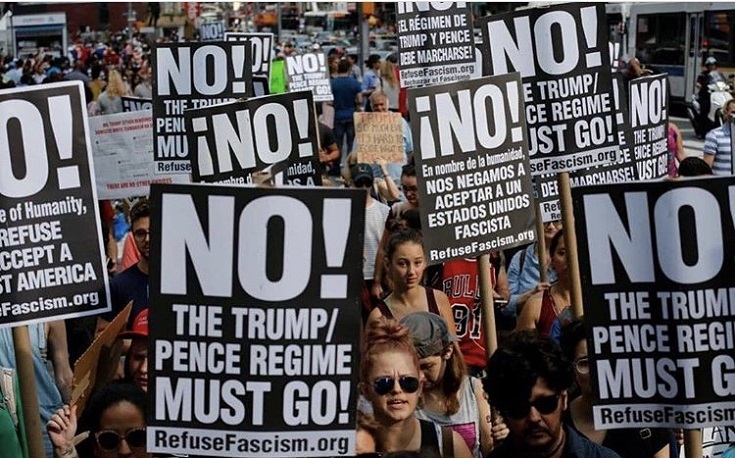The largely unforeseen election of Donald Trump has shown that the democratic process can get out of hand, however American politicians continue to insist that ‘Russia interfered in our ‘democracy’! Meanwhile, eighty-six year-old Mikhail Gorbatchev, who has often criticized President Vladimir Putin for not bringing enough democracy to Russia, has come came out in support of him running for another term, saying:
“President Putin justly enjoys the support of the people and this must be taken into consideration, and the general opinion is that the president’s work should continue for one more term……Of course it is necessary to give way to new generations, but in the situation we are living through ‘no hurry’ must become our slogan. He has not treated this problem lightly, he understood that the responsibility was great. I think this is why Putin has not announced his position for so long.”
The modern world has long forgotten how its democratic systems came to be. Among cave men, then hunter-gatherers, equality was the norm, however there was always one man — or woman — who was stronger and/or smarter than the others, and thus was acknowledged as the leader. Eventually, leaders built castles and donned silk, but they had to be smarter than their courtiers to keep their thrones, even though they commanded an army.
In time, the one percent just below the kings started putting their demands in writing, but the road to modern democracy was centuries long: the Magna Carta was issued in the thirteenth century, limiting the absolute power of the British monarch, but it wasn’t until five centuries later that British Pilgrims in the New World declared their independence from the King, setting up the first modern democracy. From there, representation in the halls of power eventually became the world norm, or at least its aspiration. At the same time, however, as populations inflated, money increasingly determined electoral results. Lately, a few people have begun to realize that only local decision-making by groups not much larger than those that helped rule early cities is likely to be truly democratic.
Aside from the impersonal nature dictated by the size of modern populations, the main problem with nation-wide democracy is that money can be used in so many ways to shape the way people vote. Nor does its intrusion end at the ballot box: the new breed of courtiers, known as lobbyists, buy influence, often contributing to the final shape of legislation in favor of their employers in big business.
In the nineteen sixties, one of the questions I put to the then President of Cuba, Osvaldo Dorticos, in the fancy office that Fidel Castro, who was averse to desk work, had ceded to him in the Presidential Palace, concerned the risk that a good king could be followed by a bad one. Recently, that risk has spawned an entire Western industry known as Russophobia, based on the notion that ‘autocratic’ government is by definition bad.
There are too many examples of ‘autocrats’ pulling their countries up by their bootstraps for that blanket statement to hold water. In nineteen-sixties Eastern Europe, which I experienced as a wife and mother, everybody’s basic needs were met, and the intelligentsia — those most likely to care about personal freedom – was allowed to travel relatively freely. Today, as the ethnographer Kristin Ghodsee has documented in her books, many citizens feel that life was better than under today’s competitive ‘democracy’.
The number of non-communist autocrats and authoritarians (as opposed to dictators), has grown in recent decades, as have the living standards of their peoples. Lee Kuan Yew, who ruled the former British colony of Singapore for thirty-three years and turned it into an ‘Asian Tiger’ with free education and medical care for all was very much a liberal. While dictators tend to be in politics for their personal gain, ‘autocrats’ or ‘authoritarians’ tend to have a vision for their respective countries as well as possess-ing human qualities that command the respect necessary to pursue it.
Vladimir Putin inherited a country that was being looted by businessmen who, under the first post-Soviet President, Boris Yeltsin, had been allowed to grab much of the country’s vast natural resources. Putin told the businessmen, known as oligarchs, to keep out of politics, and directed the Duma to enact laws that stopped the plunder. He also rescued the socialist baby from the bathwater, reinstating national health care and seeing to it that salaries and pensions were paid. The goodwill generated by his ‘autocratic’ measures enabled President Putin to continue raising life expectancy that had plummeted primarily due to alcoholism, and set Russia on a course which, after seventeen years, (as long as a four term US presidency) made it a major international player.
Together with the world’s biggest economy and most populous country, China, Russia drew India, Brazil and South Africa into an entity known as the BRICS, in a preview of what a multi-polar world will look like once the US Empire dissolves of its own weight, not due to Russian ‘intervention, but as a result of ‘democracy’ having become a figment of the collective imagination.
Deena Stryker is an international expert, author and journalist that has been at the forefront of international politics for over thirty years, exlusively for the online journal “New Eastern Outlook”.

